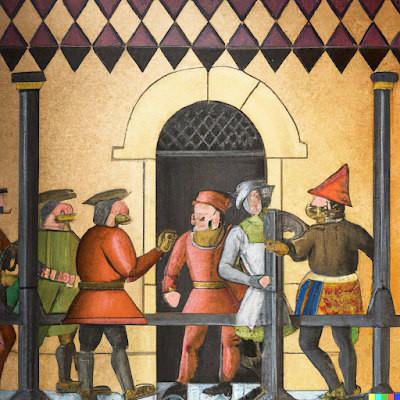I played in a few D&D 3.5 games back before I had developed any kind of distinct preferences about complexity and game feel within the TTRPG space. D&D 3.5 was simply the game other people I knew played; I was years away from learning about the then-nascent PBTA, OSR, and sundry indie movements.
Knowing games like I know them now – knowing my own preferences – I have little interest in playing, running, or designing for 3.5 or its descendants. But aspects of its design do stick with me, interest me, and provoke thoughts about our games.
Remember prestige classes? These were classes in 3.5 (and its offshoots, like Pathfinder) that PCs could access through multiclassing. They were different from ordinary classes in a number of ways, principally that they required various prerequisites (skill ranks, feats, and so forth) before the players could take them. Because of the prerequisites, prestige classes weren’t available from level one; but through careful planning, players could steer their characters toward a prestige class that would deliver a particularly specific character concept.
Prestige classes were emblematic of 3.5’s emphasis on mechanically complex characters. Much of the online discussion of 3.5 was consumed with character builds and optimization guides, where prestige classes figured prominently. More power to players who enjoyed (and still enjoy) this style of play, but the mechanical implementation of these prestige classes was not for me. It required too much planning ahead, and it felt too removed from the in-game events that might organically shape a character.
But the fiction of many of those prestige classes was still evocative. Many characters in fiction are defined more by drastic changes in their abilities – transforming or changing into something different – rather than just becoming incrementally better at each level, as where a 13th level fighter becomes marginally more effective at, well, fighting when they hit level 14. Is there some way to capture that energy, without the heavy-duty mechanical implementation?
Back to the Backgrounds
Backgrounds are one of 5E’s best (and least-appreciated) features. They’re flexible but flavorful, and can make a character three-dimensional in a way that ancestry-plus-class can’t do by itself.
But they’re often forgotten in 5E games. A few proficiencies, languages, and a narrow-use-case special ability fade into the background (sorry) as characters gain flashier class powers. How could we put more focus on those backgrounds?
Let’s start our characters at level zero. A level zero character simply uses the commoner stat block from the Monster Manual, plus a single background of their choice. These people are ordinary; we’re talking about an adventuring party that starts out with 10s across the board for ability scores. (This doesn’t mean their ability scores suddenly and mysteriously jump up when they hit first level; they simply have not yet been able to leverage or express their natural abilities just yet.)
After an introductory adventure or two – a funnel, if possible, so the players aren’t too precious with these fragile characters – they can qualify for classes. D&D 5E assumes no particular link between backgrounds and classes, which certainly has its merits; less-obvious background/class combinations like “criminal paladin” or “entertainer monk” certainly can make for interesting character concepts. But for this exercise – drawing from prestige class ideas – we’ll constrain ourselves to binary choices.
Acolyte. You grew up in or around a religious institution; one day, you had to make a choice. When you reach first level, choose devotee (cleric) or heretic (warlock).
Charlatan. You could never fit in with the rules and structure of a “normal” life. When you reach first level, choose trickster (rogue) or wanderer (bard).
Criminal. You have always lived outside the law. When you reach first level, choose deceiver (rogue) or thug (fighter).
Entertainer. You’re most at home in the spotlight. When you reach first level, choose musician (bard) or magician (sorcerer).
Folk Hero. You stood up for the little guy. When you reach first level, choose pugilist (monk) or paragon (paladin).
Guild Artisan. You were a craftsperson before your training took you in an unusual direction. When you reach first level, choose journeyman (wizard) or fortune-seeker (rogue).
Hermit. You were always on your own, until you joined an adventuring party. When you reach first level, choose loner (ranger) or ascetic (druid).
Noble. You were part of the aristocracy. When you reach first level, choose knight (fighter) or priest (cleric).
Outlander. You were most at home in wild places that would test even the bravest. When you reach first level, choose warden (ranger) or nomad (barbarian).
Sage. Your search for knowledge was what led you to a life of adventure. When you reach first level, choose savant (wizard) or bedlamite (warlock).
Sailor. Even sailing the seas wasn’t excitement enough for you. When you reach first level, choose pirate (rogue) or explorer (ranger).
Soldier. You fought in wars before you delved into dungeons. When you reach first level, choose veteran (fighter) or scout (ranger).
Urchin. You grew up in the streets with no one to look out for you but yourself. When you reach first level, choose mendicant (rogue) or scrapper (fighter).
And there we have it! Yes, this is quite unbalanced; some classes appear many times, while others appear only once. But that could be a feature, not a bug. In this example, fighters, rogues, and rangers would make up half of the class options, implying a considerably less-magical world.
With a few changes to the choices above, it would be easy enough to create an entirely different menu of options. What prestigious choices would characters make in your game?





No comments:
Post a Comment